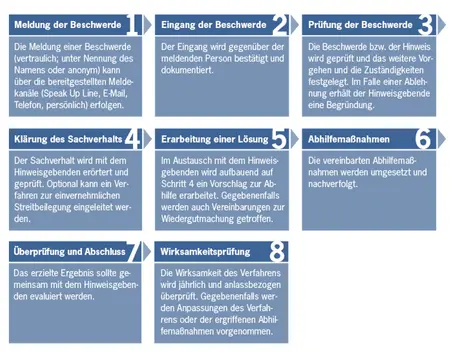
What is the Supply Chain Care Obligation Act (LkSG)?
The LkSG obliges German companies of a certain size to comply with human rights and environmental standards along their global supply chains. It focuses on transparency, risk management and the integration of due diligence. Companies must analyze risks of human rights violations and environmental impacts, take countermeasures and document this in regular reports. The law also requires companies to set up complaint mechanisms and reporting channels to counteract possible violations.

What is the Whistleblower Protection Act (HinSchG)?
The EU whistleblower protection law serves to protect whistleblowers and to report maladministration in companies. The law provides that employees who report violations are protected from reprisals by a high degree of confidentiality and reliability. It obliges ARDEX to set up an Internal Reporting Office to act as a secure point of contact for reporting violations. The Internal Reporting Office must ensure that the identity of the whistleblower is protected and that an appropriate investigation of the reported violations is carried out. The law thus promotes transparency, integrity and accountability in companies and public institutions in the EU. The Corporate Compliance Officer is appointed at ARDEX for the function of the Internal Reporting Office.
What are the similarities between LkSG and HinSchG?
Both laws aim to strengthen corporate responsibility and promote transparency and accountability.
In both HinSchG and LkSG, the focus is on reporting routes. Businesses are required to set up internal contact points to report violations of the law. This strengthens the ability of employees and External Employees to report malpractice internally.
Both laws take into account the importance of confidentiality and the protection of the identity of persons reporting violations. The aim is to protect whistleblowers and provide them with a safe space for reporting.
Both the LkSG and the HinSchG stress the need for appropriate investigations and measures in relation to reported violations. This ensures that messages are not only received, but also taken seriously.

Rules of procedure according to the LkSG
What is the purpose of the appeal procedure?
An essential part of the due diligence obligations defined in the LkSG and HinSchG is the establishment of a suitable complaint procedure. According to §§ 8 and 9 LkSG and § 16 HinSchG, every company is obliged to establish a complaint procedure. This process allows Internal and External Persons to alert the Company to potential human rights or environmental risks or violations within their own business unit and supply chain.
The aim of a complaint procedure is to assume an important function as an early warning system in order to identify problems and, ideally, to solve them before people or the environment actually get harmed.

What violations are relevant?
The complaint procedure can be used to alert ARDEX to human rights or environmental risks and violations in its own business unit and supply chain, or to report other serious violations. The concept of the supply chain is broad and includes both the direct suppliers of ARDEX, with whom ARDEX has a contract, and the indirect suppliers, i.e. the "suppliers of the suppliers". The most relevant human rights and environmental risks include:
- All forms of slavery, economic exploitation and forced or child labor;
- Risk or injury to occupational health and safety, e.g. due to inadequate safety standards, lack of protective measures or inadequate training and instruction;
- Unjustified unequal treatment in the employment relationship, e.g. on the basis of national or ethnic origin or gender;
- Violations of minimum wage laws;
- Improper storages or disposal of hazardous waste.
This list is not exhaustive. If you wish to point out risks or violations, it is better to provide the notice and the assessment of whether the notice falls within the scope of the law will be carried out and communicated by ARDEX.
Do I have to reveal my identity when I give a clue?
Informers have the option of submitting a complaint or notice anonymously. ARDEX guarantees the confidentiality of whistleblowers' identity and the protection of their personal data.
Do I have to fear professional disadvantages if I give an indication?
ARDEX does not tolerate retaliation for complaints or notices. Employees or suppliers must expect ARDEX to take legal action if whistleblowers are exposed to reprisals. ARDEX offers to remain in contact with the whistleblower even after the completion of the procedure in order to ensure that he or she does not subsequently run the risk of being exposed to reprisals.
What reporting channels are available?
1. Compliance Officer of the Company - Internal Reporting Office according to § 12 para. 2 HinSchG
Our Corporate Compliance Officer, Elmar Kerak, is at your disposal for all questions relating to compliance or for the transmission of information:
Elmar Kerak
Corporate Compliance Officer
Certified Human Rights Commissioner (TÜV)
Fixed line +49 2302 664-663Mobile +49
172 4610649
E-mailelmar.kerak(at)ardex(dot)de
Postal address: Friedrich-Ebert-Str. 45, 58453 Witten
personally: Friedrich-Ebert-Str. 58, 59453 Witten (by appointment)
Our Corporate Compliance Officer was also appointed by the management as human rights officer within the meaning of § 4 para. 3 LkSG. Of course, our various reporting channels (see below) are also available to all those affected in the company and along the supply chain in order to provide us with any human rights or environmental information.
2. Speak Up Line (anonymous whistleblowing hotline)
The Speak Up Line offers whistleblowers the possibility to anonymously transmit violations along the entire supply chain directly to ARDEX.
You can reach the Speak Up Line online or by calling the free number: 0800 1818 952 (Code: 108339.
3. External reporting office according to §19 HinschG - BfJ - whistleblower office
